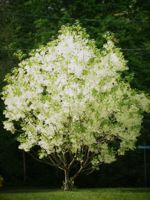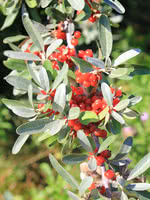Mon-Fri 9am - 5pm Mountain time
Silver Buffalo Berry vs White Fringe Tree
Chionanthus virginicus
Shepherdia argentea
NOT AVAILABLE THIS SEASON - MIGHT RETURN
White Fringe Tree is known for its fringe-like white flowers. It can either grow as a small tree or a large multistemmed shrub. The White Fringe Tree has separate male and female plants. Both male and female flowers have white fringe-like petals, but the male flowers are longer and showier. The female flowers give way to clusters of dark blue to black berries. These berries are not edible for humans but attract birds and other wildlife.
The White Fringe Tree is tolerant of clay soils, saline soils, and air pollution but does not do well in prolonged dry conditions.
Silver Buffalo Berry is a cold hardy, ornamental shrub that is commonly used in the first row of shelterbelts instead of caragana or lilac. It features subtle yellow flowers, smooth grey bark, and red fruit. On occasion orange fruit is produced and rarely a yellow fruit. Please note: we regularly collect the rare yellow and orange fruit to use for our seed source.
Long-lived and slow growing, Silver Buffalo Berry is commonly found around sloughs, in coulees, and on light soils across the prairies, and grows best in full sun.
Buyers can enjoy increased bird life to their property, as this shrub acts as a habitat plant. It is also commonly planted for its ornamental and winter interest. It is native to parts of central and western North America.
This species is also known as one of the more salt-tolerant species for those with saline soils.
Note: this berry has mixed reviews when fresh, but makes a desirable jam or jelly with what is described as a clove and pear taste.
White Fringe Tree Quick Facts
Silver Buffalo Berry Quick Facts
In row spacing: 0.9 - 1.2 m (3 - 4 ft)

